As the Executive Director and Co-Founder of Miami Valley Meals, Amanda DeLotelle leads a dedicated team that transforms donated and rescued food into nutritious meals for those facing food insecurity.
In this episode, Amanda shares the inspiring story of founding Miami Valley Meals during the COVID-19 pandemic, the creativity and care that goes into every meal, and the value of collaboration in building a food-secure future.
See how you can get involved with Miami Valley Meals and follow Amanda on LinkedIn.
Listen Now!
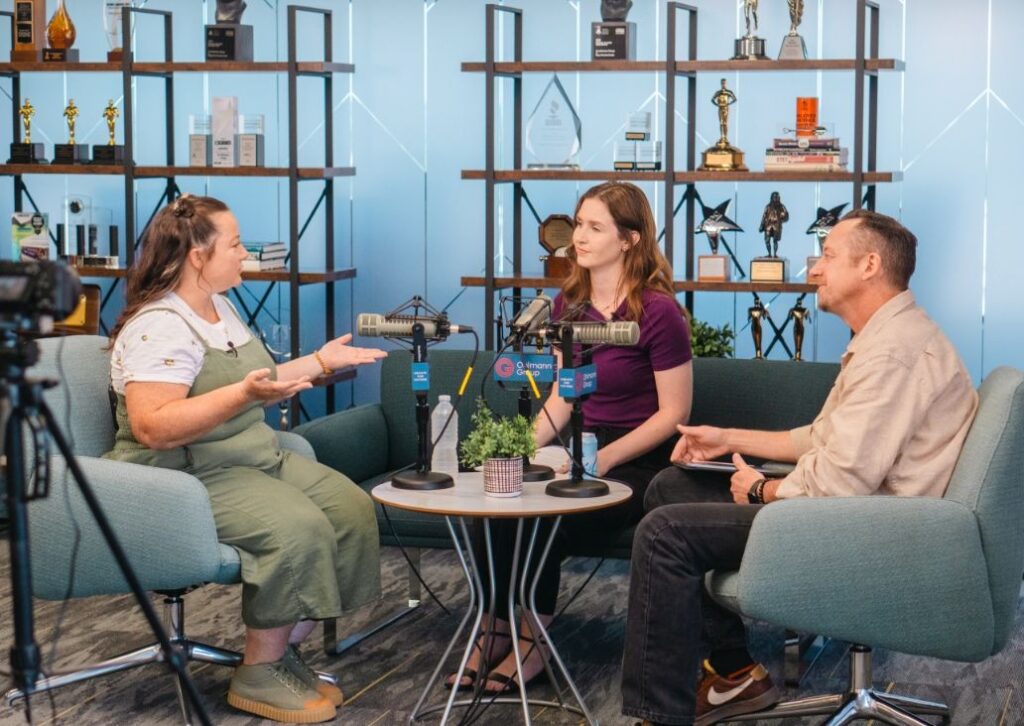
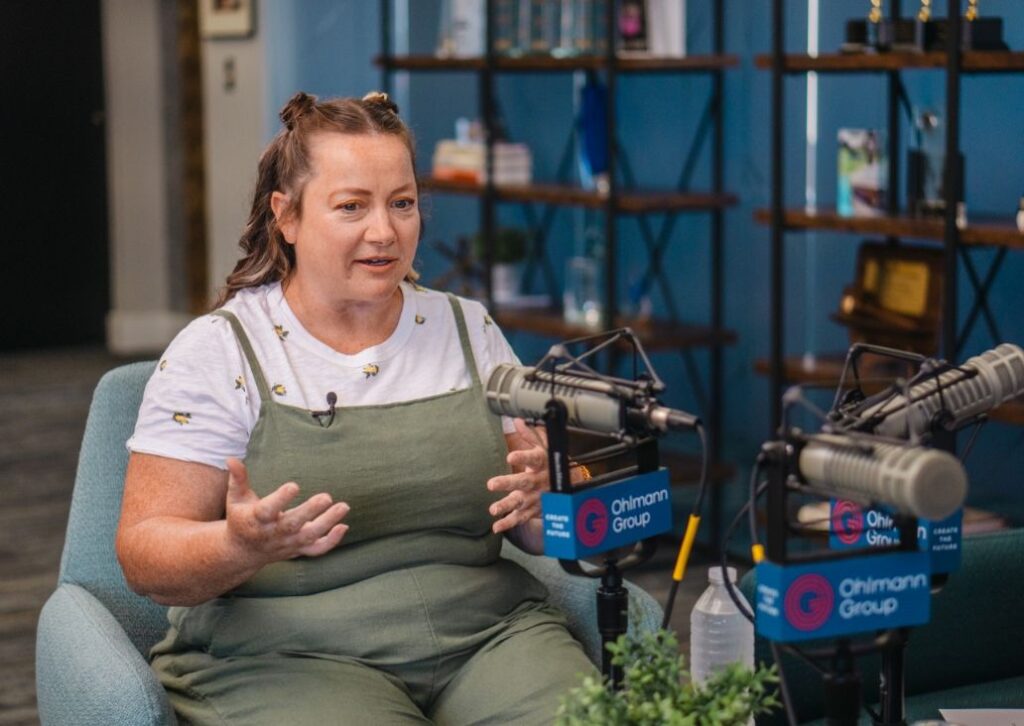
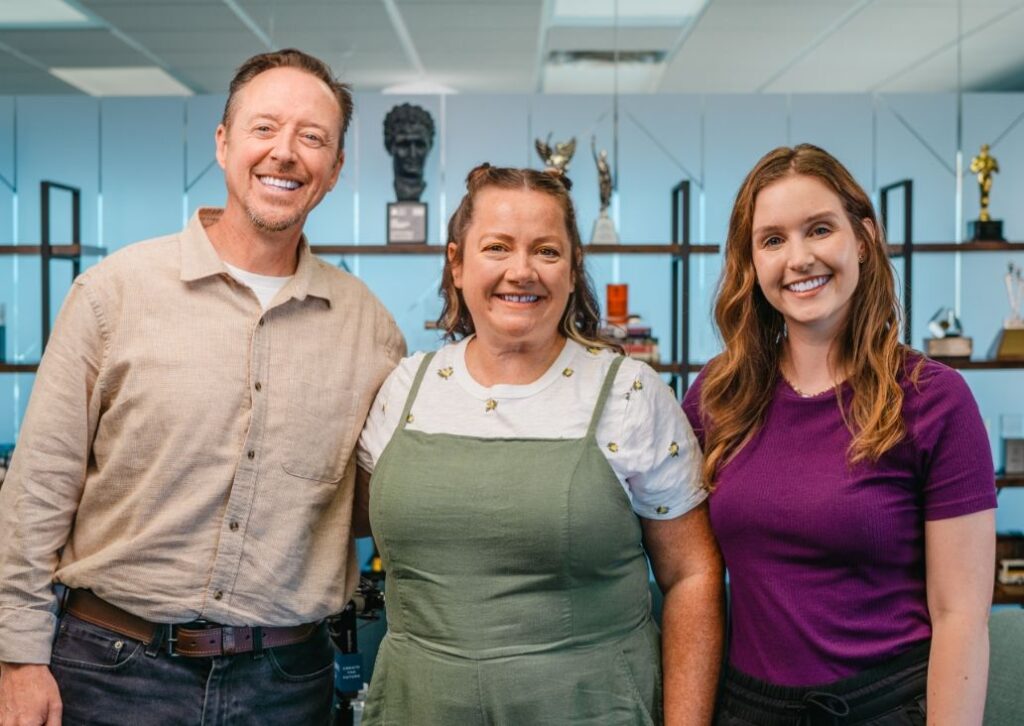
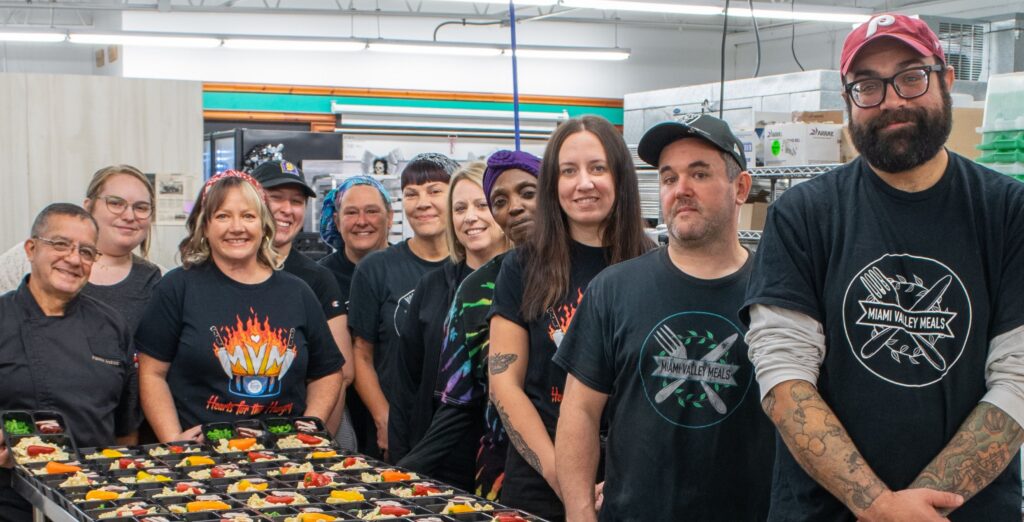
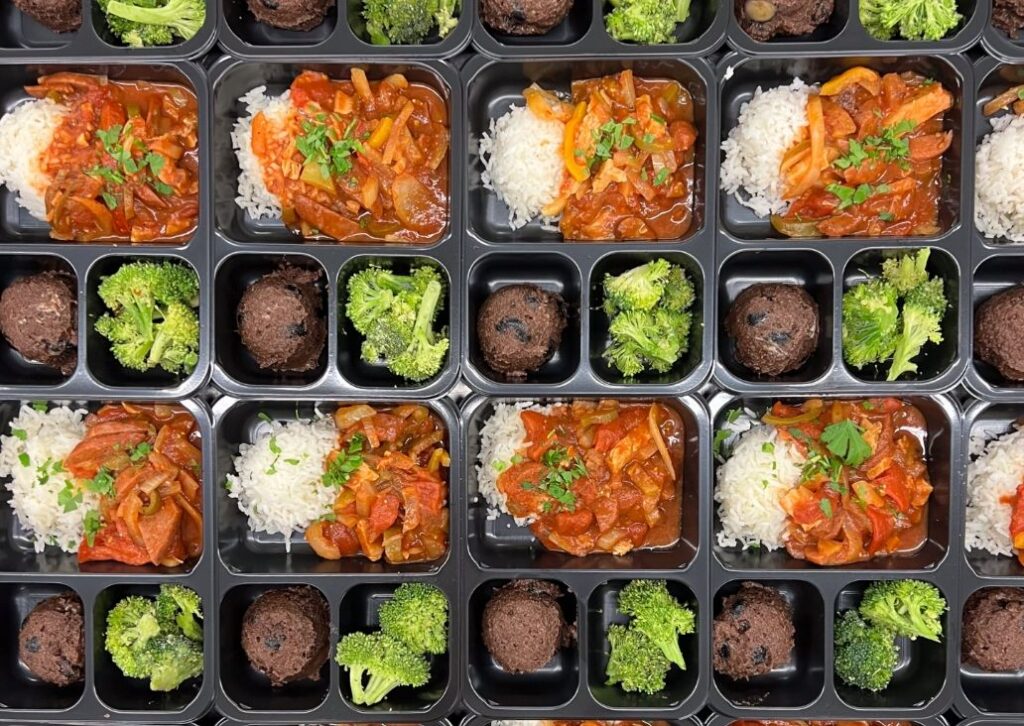
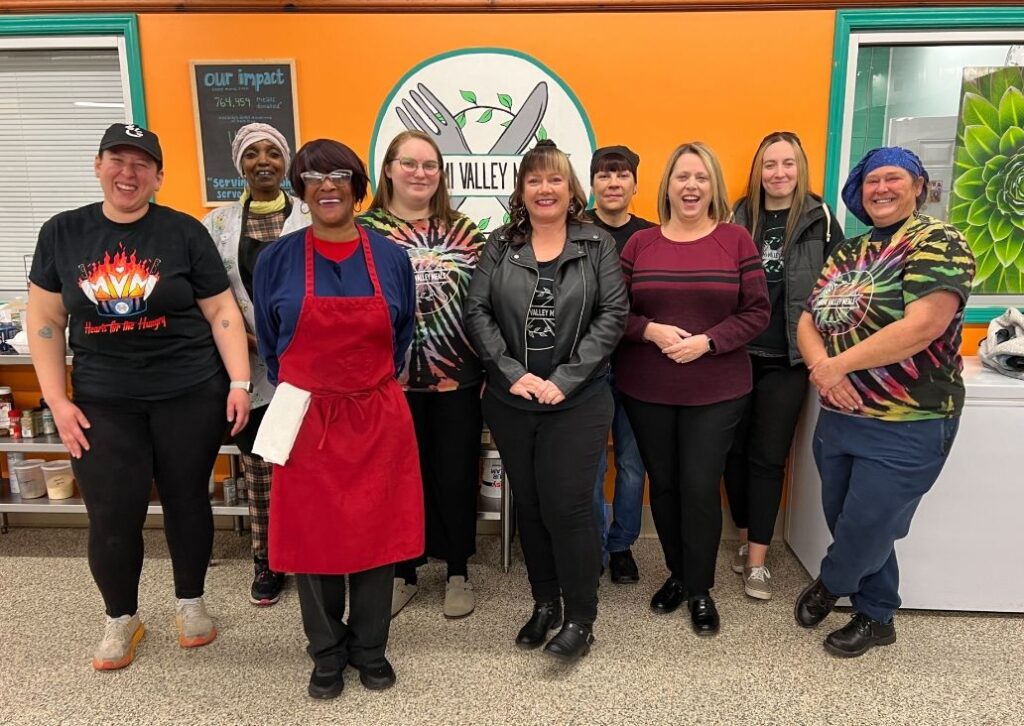
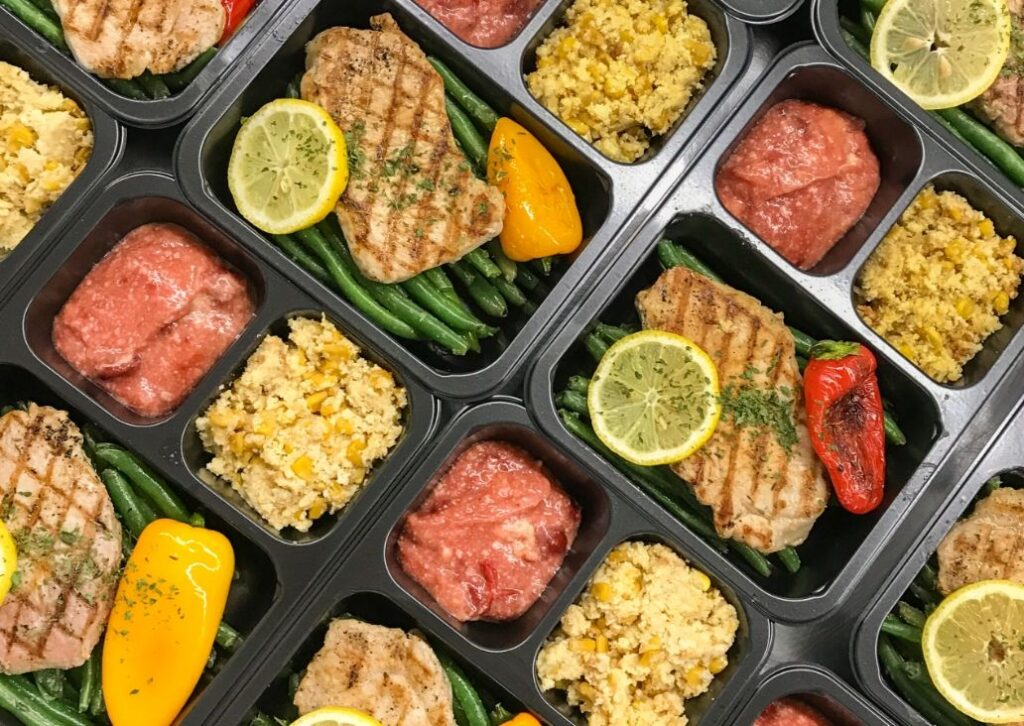
Episode Transcript:
Evelyn Ritzi: Hello and welcome to Creating the Future. I’m Evelyn Ritzi.
David Bowman: and I’m David Bowman,
Evelyn: and today we’re joined by Amanda DeLotelle, who is the co- founder and executive director of Miami Valley Meals.
Now celebrating its fourth anniversary, Miami Valley Meals is a local nonprofit dedicated to serving those who serve the hungry by transforming donated food into nutritious, chef-prepared meals. We’re thrilled to have Amanda on the podcast today to hear about how she’s using creativity to collaborate in the Dayton community and propel Miami Valley Meals’ mission forward.
So let’s get started. Great, Amanda, this podcast is all about creativity, and especially in the Dayton region, and so we’d love to know a little bit about your background, because you have a creative background that some people might not necessarily know about. So could you tell us about that?
Amanda DeLotelle: Absolutely. So that’s very true. Back in the day, I was a soccer player at one point, and I wanted to play soccer in college, so did some tours of campuses, and Ball State University just blew my mind with how gorgeous the campus was, and it was a division one soccer program. So that’s actually how I ended up there. Now they did also have this wonderful telecommunications program video production. David Letterman went there. So it was just a great opportunity to go be a part of it. And it was the inaugural women’s soccer team at Ball State as well. Yes. So it was exciting. I made a lot of great friends there. I went through that program, and then stayed for my Master’s in their first ever Digital Storytelling masters, which it’s called something else now the Media Masters, I believe so stayed for that, and then along the way, I was in the hospitality industry. I worked at the Root Beer Stand for like, 12 years. Nice. Yes, no, roller skates. Everybody thinks that, but no, you don’t want that. There’d be chili everywhere. So, So I worked there, and along the way, after school, I was kind of just bouncing around in my 20s. I wasn’t really sure what I wanted to be when I grew up. Traveled a bit to Brazil a couple times. I had exchange students growing up so I could stay with them, and then I came back. I found some roles in hospitality again, media. I just wasn’t finding the right, the right fit, or couldn’t, couldn’t make the right connection there. But I kept finding great jobs in hospitality. So I worked at a country club, and then eventually went, went to the Schuster Citilites at the Schuster, I stayed there for seven years. Absolutely loved it, did events, and by the end, I was the food and beverage director. Unfortunately, Citilites shut down, so we all kind of went our separate ways, and that led me to that was in January of 2020, and we all went our separate ways from new jobs. And then here comes the pandemic.
David: Pandemic. Yes, I vaguely remember that.
Amanda: What a wild ride that was.
David: Is the pandemic, then how Miami Valley Meals came to be?
Amanda: Absolutely, so in March of 2020, of my former colleagues, Chef Matt D’Angelo. He’s he was the executive chef at Citilites. He reached out to say, basically, like Amanda, all of our friends went and got new jobs, and the hospitality and culinary roles and the pandemic coming, everything’s going to shut down, and beyond that, this is going to be so devastating for our community, for people experiencing food insecurity, maybe we can help. And I said, maybe you’re right. So Bill Evans, who’s a local food security champion connected us to the House of Bread to have a meeting just see how many we might help. So that’s kind of how it all started in the day. I think was the day after that meeting, Matt and I were both furloughed from our respective jobs. That was when everything shut down all the restaurants as you were. All, and so we were able to call some buddies, because nobody was working, and get in there, like the next day, wow, yeah, it was kind of crazy. So that was kind of, I think how we were able to be so effective and impact impactful right away is because it was all of our pals that we worked with for years. We already trusted each other. We knew each other’s strengths and weaknesses, so we could jump right in and be effective. So we were there at house of bread for a little bit, supporting their staff. And then about a week later, St Vincent de Paul reached out, and they were, you know, having to put people in hotels all over the city, and it was just a lot to manage all that that those meals. So we called some more buddies and said, Hey, do you want to help us? We’re trying to provide meals and for people that don’t have food. And they said, Yeah. And we had two separate teams. Then at St Vincent and House of Bread. After that, we had a lot of there was a lot of different organizations, nonprofits, trying to work together to figure out, like, what’s happening, what are we going to do? And they stepped in right away to support us and and give us some, some helpful ideas of how to move forward, just support in general. And said, keep going in the Miami Valley Community Action Partnership was getting a great deal of cares money, block grant money, and they said, Can you do this on a bigger scale? And we said we will try our best, and that’s how it all kind of got rolling. It’s been we’ve had just really dedicated and passionate folks that that wanted to help the city from from all angles. People were coming and organizations coming to support and uplift what we were doing. So that’s kind of how it started. We didn’t have a kitchen at first, so we were at Life Enrichment Center in East Dayton. Okay, it’s no longer there, but we were there for about three months while during the pandemic, because their culinary program was was shut down for a bit, so we were able to work out of there. And when we were trying to figure out, like, how do you get meals to folks, we looked around and saw all those supporting organizations and said, Let’s not reinvent the wheel. Let’s go through those existing pathways, and then they’ll be able to connect their services as well. When you’re in poverty, food insecurity is likely not your only issue or or barrier, so these other organizations will be able to to provide that. And the thing in the pandemic, I didn’t even think about, though, some of these folks weren’t leaving their homes at all, yeah, so this was their only point of connection in the day, was to get these meals. So it was really powerful. And just, I’m so glad that we were able to to get all that support and have such a special team that that showed up every day and made it happen.
Evelyn: It’s just so, it’s so powerful and, and I’ve heard you say before, like, food is love, and that’s, that’s what it is like caring for the community. And Miami Valley Meals has evolved a lot since then, just done more and more and more. And can you talk about the creativity involved in taking donated food items, turning them into meals that are, you know, not just an entree, it’s a it’s an entree. It’s got all of the necessary nutrients and like, even dessert sometimes too. Can you talk about the creativity involved in the kitchen with your chefs?
Amanda: Absolutely. I may be biased, but I think I got the chefs, the best chefs in the biz. They are so caring and creative in everything they do. Some of them have experienced food insecurity themselves so or worked in other places that they’ve helped other folks, so they know what’s needed, and they also it’s back to that dignity piece and that love piece, giving something that we would want to give to our families, that we would want to eat. So we try to make a really complete little package. It’s, we have both individual and half pans, but there’s typically a protein, starch, vegetable and a dessert, because dessert. Gotta have dessert, right? Yes, we’ve got to So, so we always put that in there. But the chefs are just my chefs have come from. They were from the for profit industry. So we felt, like early, like, from early on, like, that same level of care and dignity that you give to somebody in a restaurant, why doesn’t everybody deserve that? So we try to bring a lot of those, those skills and talents, while also thinking about who’s eating this and. In what would fill them up and taste good so, but they are wild creative. I’m actually the worst chef at Miami, that’s okay. I’ll do the paperwork. So they just bring so much talent from their former jobs. Laura has this Cajun Creole background, Angie’s vegan. She makes these beautiful vegan dishes. You will never miss the meat. And Chef Jalisa brings from swaino Patricio is from Ecuador. It’s like this melding of the mines, and there’s not that typical. There’s not too many chefs in the kitchen there. They’re really great at working together and brainstorming to make something complete and satisfying, because everybody deserves a good meal.
David: What’s the most unique or sort of like, a favorite meal that you saw someone make? Where you’re like, how did you come up with that? Out of, you know, because a lot of you know what you get is donated food, right? So you don’t know what’s coming.
Amanda: Absolutely, it is wild when we get the different palettes of food and we don’t know what’s coming. So they’ve done some wildly creative things, but one of the ones that sticks out, in my mind, is unique. We had, like, this whole palette of, like, sweet tea, and then we had pork butt. So together they they became one, and they marinated that overnight, and it turned out to be a beautiful dish, like really filling and just tasty. Angie’s always doing some creative vegetarian or vegan dish chef Marilyn makes these beautiful baked goods out of things you you wouldn’t necessarily think, but she’s kind of a wizard with that. And then Laura’s dumplings, she makes homemade chicken and dumplings are out of this world. Poppy’s always coming up with the flavor. Really flavorful things. We have to be mindful of spice. But we do so many, they do so many creative things. I just think they’re all superstars.
David: Now, do you gravitate towards in my mind, when I think of cooking, right? You’ve got kind of on one end of the spectrum a baker, right? And it’s precision, it’s, it’s very scientific. And then you’ve got, like, I’m a cook on the other right, which is more like, here’s what I got. Like, I’m just gonna start throwing it together and taste it, no, add this, and you kind of make it up as you go. I’m not, unsurprisingly, I am that kind of person in the kitchen.
Amanda: So they’re doing, they have to have precision with the baking, of course, but some of it is absolutely a trial, trial by error, especially at the beginning, when we were working out desserts, you had to make them. We had to test them in the microwave. And yeah, a couple of them may be caught on fire, but we had to figure out all those recipes and how to cook it, because the majority of our meals are frozen, so we have to think about that, like, how is this going to reheat? But we always want to be conscious of how that the person who’s getting the meal is going to like it. So we do put a little QR survey right on the meal we print, we print all of our ingredients on the packaging, back to that dignity piece. We want people to know what they’re eating. And there is a QR code for a survey there so they can give us honest feedback. Granted, if you don’t like broccoli casserole, you’re not going to like mine or Evelyn’s, but, you know, so, yeah, they they just do wonderful things in there.
Evelyn: They do and so do you. You’re so humble, such a servant leader. But one of the reasons I really wanted to have you on the podcast was to talk about the ways that you are intentionally seeking those opportunities to collaborate with folks in the community, whether it’s the nonprofits that you partner with, or businesses and other organizations, and you’ve just been so intentional about it, and something I really admire about you. But can you talk about some of those collaborations and why it means a lot to you to collaborate,
Amanda: Absolutely and thank you that that’s very kind of you to say is it’s, it’s easy. It’s easier to do things like this when you have a great team right next to you. So um, but the the collaborations are, that’s what we were built on. Um, there were so many organizations that took time out of their day, out of their focus to say, hey, Miami Valley meals, we can help you with this. Or have you thought about this? Or make sure you watch out for this. It was incredible all of these nonprofits that came around to like, support and lift us up. So the nonprofit world in in our model. People is nonprofits coming and picking up from us. So we have about 50 active nonprofits. Without them, we’re not reaching the people. They know their neighborhoods and communities better than we do. They know where the need is, and they know how they can connect their other services. So that is just built into the model for the most impact, for sure. Beyond that, I think it when you’re in the nonprofit world, I feel like you’re there to be a helper, and you’re there because you care about people. So other nonprofits, they’re in it for the same thing, right? But sometimes folks outside of the nonprofit world might not know what the struggles are, what the barriers are, what the need is, so it’s very intentional to reach out, outside of our not bubble, but outside of our nonprofits ecosystem, and reach out to others so they can help us spread the word. Help us shine light on the issues that many people are facing and and really figure out how to to help everybody. So that’s that has been a very intentional the universities we work with, Sinclair, UD, Wright State, The Modern now, The Ohio State University we work with now. So it’s, it’s very important to me that we’re engaging youth. You know, you talk about the brain drain, when so many students after school like leave Dayton, maybe they’re part of how we keep them is to get them ingrained into our culture and our to our community to see what’s going on so they care and they want to stay because we want these great minds to stay with us. So that was very intentional to keep people engaged with our community.
David: I know it’s, I mean, it’s obvious how passionate you are about the cause and the work I know also you are very passionate about developing people right, helping them find their passion. Or maybe it’s that combination of skill set and passion and then really sort of lighting that fire and saying, Hey, how do we take that and use it to help further our mission, but also to help you, like, grow and develop. Talk about that. And does that come from your sports background? Does it come from, you know, all you know, where does that come from? And why is, why is this too big deal to you?
Amanda: Um, maybe it’s because I was an only child growing up that I, like, I always sought out friendships and was always relatively outgoing and joining teams and just interested in a lot of different things. So that probably comes from there, but I think it’s on my LinkedIn. Like, I’m a Dayton hype woman, and I’m all about like, building teams. I I think there’s nothing greater than than helping somebody realize how great they are. So this is one of the ones that I might accidentally cry. So I can’t talk too much about it. I love it. I love to build up others so so they can be more effective and for themselves and for the community, the greater good.
David: It’s one of those things too. Like, when you think of, you know, creativity, there’s sort of this notion of, like, the lone genius toiling, or, you know, with these big ideas. But my experience with creativity is always we is is better than me, right? And so when you foster that dynamic of a you’re helping people develop their skills, but also building that sense of team. So it’s like their skills are lifting up the skills of everyone. And the whole is greater than some parts, right? Which is when that happens, like it’s just magic.
Amanda: Absolutely, magic is the word, and I see it in the kitchen all the time, when everybody’s like, just vibing and together, it’s it’s something so special, and you’re absolutely right. Some people need a little more care and support than than others, and some are just already there and shining. But part of that is helping those that are shining to help those that need a little little support too. We all need support in different ways. So it’s, it is a magical thing when you have the right team in place, and when you invite others to join that special space and that special mission.
Evelyn: So inviting others in, that’s a good segue into my next question, which was going to be about, you know, you you care about different learning about different cultures, and bringing that into cuisine is a really interesting way that you’ve grown Miami Valley Meals and and evolved what you do. Can you talk a little bit about inviting others into the kitchen to share their culture the food? That they love to make, and how that might help Miami Valley Meals better serve Dayton’s diverse population?
Amanda: Absolutely so when you think talk about comfort food, comfort food, to me, might be totally different than to somebody that maybe is a refugee from a different country or an immigrant from a different country. So last year, we really put some emphasis on bringing in some some international cuisine. And how we did that is we invited certain some different chefs. They might have been home chefs or professional chefs from different backgrounds. We had Chef Gabby in from Afro Meals. She was one of our first guest chefs to come in, and she did worked with Welcome Dayton to figure out, who do we have living here, and what kind of food would they like. So it was really again, those intentional collaborations, because we want to be comfort to as many people as we can. Now, it’s a little trickier, because we don’t in 2023, 90% of them, of the food and the meals was either rescued or donated, so we would have to buy in different spices and things. But there’s a version of rice and beans across the universe, maybe, dare, I say, the universe, at least across the world. So we wanted to bring that in. Not only was it great to learn those new styles of cooking, but it was a great team building and exercise. I took care of pickups that day. So Nick, our partner, the person that gets all the pickups ready so he could participate too. We had Fatima from the Ahiska Turkish community come in. She taught us some things. Sang Yun taught us some Korean stuff. So it was just such a cool experience. And, you know, I hope to grow that program eventually so we can get a little bit more into that. But I think you got to start the conversation, and you got to start gathering those skills so you can can move forward and do something extra special. Yeah,
David: Yeah, well, I know the Ohlmann Group, we were introduced to Miami Valley Meals as part of a volunteer project. It was around Thanksgiving, and we all came in and scooped and played it and did all kinds of really cool, fun stuff. And we left, we were just blown away. And all of us oh my gosh, like, what a great place. Can you talk about the importance of volunteers to Miami Valley Meals, and if someone were to be interested in volunteering, what might they be doing?
Amanda: Absolutely. So we have volunteers most days. We have shorter shifts during the week for the most part. That you can sign up online through our website Miami Valley meals.org, and that’ll send you through. Point is a system that we use. We have shorter shifts, about two hours, one in the morning, one in the afternoon, because we understand people are busy, but they still want to give back. Yeah. We even have an incoming board member leadership date and match for next year, Brandon, he couldn’t fit into either of those groups, so he comes once a week on his lunch break, and it’s awesome. So we’re going to work with you to figure out what fits your schedule best, because again, people want to give back, but they might not fit the exact time slots. We also take groups. We’d love to have groups in groups are pretty much anybody over six or on the weekends, we might occasionally open a Saturday for over eight people. We do have a smaller kitchen, so like 15 is kind of our our max, if we have some notice. But those volunteers are so important to our mission, to helping us get ahead. There’s there’s lots of scooping, yes, but if you are handy with a knife, then we’ll have you help us prep some things. Sometimes there’s like cleaning that we need help with. Or we had about five groups from Carroll High School come the other week, and they moved our whole garden, our herb garden. Even made it fancier. There’s like a curve in it and everything. So we we have all kinds of different jobs. We’re also looking to see what volunteers are interested in doing beyond the kitchen. Sometimes that’s a little intimidating for folks. So if they want to be on a committee, like for Diced in Dayton, they could do that, or one of our other committees.
Evelyn: I know you mentioned an herb garden. You use some of your fresh herbs in your meals?
Amanda: Absolutely. That’s a thing that we don’t get donated too often. So we, we tried to grow our own right there. We work with the Foodbank to compost some of our things. The Foodbank’s given us some great produce. Mission of Mary, UD Sustainability started giving us produce. So we have all these wonderful partners that are making sure we can keep doing what we’re doing.
Evelyn: I think that sustainability aspect is such a neat and unique. Part of your model too, is, you know, taking things that you know are just on the verge of still being usable, and they need to be used right now.
Amanda: So, like 40% of food goes to waste every year, and a lot of that is just because it’s surplus, or because of a menu change, or for a variety of reasons we want it bring it on over. So neat. We’ll elevate those ingredients and make a complete meal.
David: I think something so fascinating about what you do and the space you occupy, right? Is a it’s restaurant slash food service, which I think, like that should be one of those things that everyone has an experience with, right? It’s whether you’re back of house, front of house, like, it is an exercise in typically high pressure problem solving, being creative, working as a team. Like, there’s just so much you learn from that you combine that with the Miami Valley Meals, sort of mission and model, which is, you know, bigger problem solving. Not like, hey, somebody gonna like the taste of the turkey, but like, how do we feed people creativity with like, Well, what do we have to work with today? So talk about, like, how that restaurant experience and food service experience and I mean, and sports is kind of a similar thing, where it’s soccer, right? So don’t know where the ball’s gonna go. There’s 10 other people sharing the field with me, all have different skills and do different things, and if we work the right way, we will win or have a good time losing. But talk about like, how those things inform your creative process, and how that’s important to what you do.
Amanda: I think you know, creativity comes from a couple different spaces. It can come out of absolute necessity. We have to address this problem right now and get it done. But it also comes from, I think it it can come from being in a safe space where you can freely be amongst people that believe in you too, and that’s the culture that we’ve tried to create a Miami Valley Meals when, when you know that I’ve got your back, you’ve got mine, you have that, that safety and in thinking big and thinking creatively, create, yeah, sorry, um, so I and then the other is necessity, you know. So those two things kind of come together for us. So we’re able to to be amongst the team that that trust each other. Also, I think since we came from like restaurant, the restaurant business, we’re all scrappy hospitality and culinary folk, you just get it done. We literally had a wooden slide. That was how we got food up and down in a basket, until recently. Thank you Montgomery County Solid Waste for our new conveyor. But you just make it happen. And I think the thing that pushes that even further is the drive to do something impactful and and for the greater good. And that’s what my team they they want to make people’s lives better, and they want to do it through food, because that’s their love, light language.
David: You referenced a couple minutes ago, Diced in Dayton? Yes, so what is Diced in Dayton?
Amanda: Diced in Dayton is our annual fundraiser. It’s so much fun. We have 12 local chefs from the date greater Dayton area, they come together. We give them a mystery box, kind of like how we deal with every day. We do give them that about three days out. And then they come to the event with bites, like it’s a catered event list. And then the people that are attending have taste tickets. They go around and taste everything. There’s a judge’s vote and people’s choice. And then those top two get a new basket, mystery basket, and they battle it out on stage. And it is so fun.
Evelyn: It is so fun. It’s really cool. Just the collaboration, again, with the Dayton area chefs and getting as a regular person, non-chef, getting to see the folks that are making those meals at some of those favorite restaurants in Dayton, and interact with them, but also supporting such a great cause
Amanda: It is, you know, when we were talking about collaboration earlier, you know, I think just growing up kind of in the Dayton area, it’s like. All your buddies are growing up, and they’re running restaurants, and they’re doing all these amazing things. So I think this is like an extension of this, to be able to invite in all this local talent. Dayton is talented in so many ways. Our food scene is wonderful, so getting to shine a little light on them, and then, you know, shine back on Miami Valley Meals for a moment to to fund our mission is something special, but it’s just so exciting. Like, the whole time I’m, like, just stoked to be there. So I love it.
Evelyn: One final question that we plan to ask all of our guests, is, what’s the future that you want to create in Dayton? Which is big question.
Amanda: It is a very big question. I think, I think we’re we’re working on it, and we’re getting there, but it’s about kindness and collaboration and lifting each other up, like hyping up your friends to go be their best selves, hyping up your team to be their best selves, having honest and direct communication from a place of kindness to uplift what we’re all doing, giving people chances. You know, people go, have all gone through a lot of stuff. Even look at the pandemic alone. But there are people that are facing barriers every day. It doesn’t hurt you to be kind or to offer to offer some help, or just a smile, even like, start small and it will make a ripple. So I think the future is just being kind and collaborative and opening up spaces for more inclusivity and other ideas, diverse ideas, so we can build a a greater space of kindness and opportunity.
David: Love it.
Evelyn: You’re already doing such a great job at that too. I feel inspired to smile more today.
Kitchen Photos courtesy of Miami Valley Meals.
